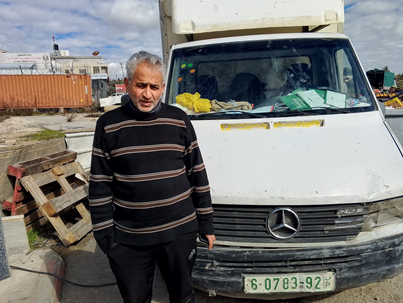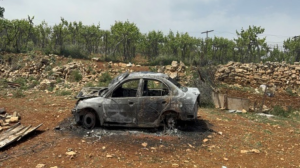Introduction
The Israeli Occupying Forces (IOF) have resumed construction of the separation barrier around the village of Sinjil, northeast of Ramallah in the Occupied Palestinian Territory (OPT). This development forms part of a broader strategy to entrench Israel's settler colonial apartheid regime and unlawful annexation across the West Bank. Since 28 September 2024, extensive IOF bulldozing operations along Route 60—a settler-only bypass road—have uprooted nearly 200 trees, including over 130 ancient olive trees.
Strategically located south of Sinjil, the area of Jabal al-Tell has seen the emergence of a new Israeli outpost, established on privately owned Palestinian land classified as so-called Area "B" under the Oslo Accords. The site's proximity to Route 60 makes it a focal point for further Israeli expansion, as Israel appropriates Palestinian lands for "pastoral" or grazing outposts—one of the key instruments of Israel's land seizure tactics. This so-called "pastoral settlement policy," bolstered by IOF protection, has resulted in increasing restrictions on Palestinian access to farmland, arbitrary land seizures, and the imposition of barriers that fragment the territory and isolate Palestinian communities. The construction of barbed-wire fencing between Sinjil and Turmusayya, together with the closure of village entrances and enforcement of permanent checkpoints, has created a de facto annexation regime in the area.
Between April and May 2025, these dynamics escalated. Al-Haq, documented a series of serious violations during this period. This report outlines the key findings of those violations.
-
No Safe Passage: Violent Settler Attacks Increase Along Road to Sinjil
Mohammad Mansour, 58, and his son Musab

The road to the village of Sinjil, northeast of Ramallah, has become a daily threat for Palestinians. Movement now requires constant vigilance and risk assessment, as armed settler attacks—carried out with full protection from the Israeli Occupying Forces—have intensified. These assaults indiscriminately target civilians, homes, lands, olive trees, and even animals.
Mohammad Mansour, 58, a food distributor who relies solely on his delivery work for income, recounts an attack he endured on 19 January 2025 while entering Sinjil via the village's only accessible northern entrance, located on the Al-Lubban ash-Sharqiya/Nablus Old Road. A coordinated group of settlers ambushed him with iron rods, hammers, and firearms. They surrounded his truck—his sole source of livelihood—and terrorized his son, Musab, shouting "Arabim, Arabim" (Hebrew for "Arabs").
Fearing for their lives, Mohammad drove forward at a very slow speed—about 20 km/h—worried that any contact might be construed as an attempted ramming, potentially triggering deadly force by Israeli soldiers. Settlers smashed the front of his truck with paving stones, injuring his son. The damage amounted to over 30,000 shekels (9,000 USD). While escaping, Mohammad witnessed flames engulfing homes in the village, including the residence of Abdel Ghani Foqahaa. He was forced to take a long detour through several villages, a journey that lasted over four hours –– the entire time, disturbed by the sounds from his broken truck. When he eventually reported the attack to an Israeli soldier, he was mocked and told to "go complain to Abu Mazen.
Wasim Shabaneh, 26
On 4 February 2025, Wasim Shabaneh, 26, a Palestinian bus driver for Salma Transport Company, was targeted while operating his regular route between Sinjil and Ramallah. The bus was carrying a group of passengers, including men, women, elderly individuals, children, and patients returning from dialysis treatment. As the vehicle approached the vicinity of the "Ein al-Haramiyyeh" area, an Israeli settler blocked the road and began shouting in Hebrew, terrifying the passengers. Shabaneh pleaded, "Please, just let me pass," but was soon confronted by another settler vehicle—a Steron van—carrying a group of settlers who surrounded the bus.
They began smashing its exterior and attempted to forcibly open the door to reach the passengers inside. Settlers forcible removed Shabaneh from the bus and physically assaulted him. Notably, an Israeli military patrol was present at the scene and witnessed the attack. Although soldiers briefly intervened to separate the assailants, the settlers continued their assault without any real effort by the Israeli forces to stop them or protect the Palestinian civilians.
Mohammad Fuqaha, 15
Even children have not been spared from the escalating threats in the village of Sinjil, where Israeli settlers carry out widespread and systematic attacks against the Palestinian civilian population—backed by Israeli occupation forces. On 19 January 2025, Mohammad Fuqaha, 15 recalled how his family home was set ablaze by settlers, only to be targeted again in another arson attack on 17 February 2025.
On a separate occasion, Mohammad recalled to Al-Haq how he was walking with his mother and cousin toward a local supermarket near the only open entrance to the village, known as the "electric transformer road," after the Israeli military had sealed off all other access points. Due to heightened tensions in the area, his mother suggested taking a narrow dirt path running between neighbourhood homes, avoiding the main road that connects directly to the Old Nablus Road—frequented by both Israeli soldiers and settlers. Despite their caution, a settler driving at high speed deliberately swerved toward them in an attempted ramming, terrifying the Mohammad and his mother. The incident underscores a grim reality: even the most basic right to walk freely has become perilously unsafe for Palestinian civilians, especially children, in the face of unchecked settler-colonial violence to maintain an apartheid regime.
-
The Forced Isolation of Shuriyya (a village affiliated with Sinjil): Collective Punishment and Settler-Enabled Persecution
Nimer Awaisheh, 43, lives with his extended family in the Shuriyya area, located on the eastern outskirts of Sinjil village. This area comprises three residential buildings owned by the family prior to the Israeli occupation in 1967. Today, Nimer has been trapped—not only by Route 60, which separates the family from the rest of their village without any pedestrian crossings—but also by a new military order issued by the Israeli authorities in February 2024 to confiscate 30 dunums of adjacent land for the construction of a security fence.
The implications of this isolation are profound. What was once a short road crossing to reach Sinjil—where the family's business and children's schools are located—has now turned into a 55-kilometer journey through seven surrounding villages. Beyond the physical burden, the separation puts residents of Shuriyya at grave risk: they are now effectively cut off, vulnerable to settler violence with no means of rapid assistance or escape. Awaisheh recounted to Al-Haq, that since the events of October 2023, settlers have attacked the area twice—vandalizing vehicles, throwing incendiary bottles, and setting fire to a relative's car. As a result, Awaisheh was forced to erect a protective fence around his home.
In April 2024, the Israeli authorities began installing the actual separation fence, reinforcing the community's fears of permanent disconnection. Simultaneously, the expansion of Route 60 is advancing dangerously close to their homes, yet no official notice or consultation has been provided. The residents of Shuriyya now live under constant threat—not just of forced displacement, but of being left entirely alone in the face of escalating settler violence.
-
Settler Attack Killing Wael Ghafari, 48
On the morning of 21 April 2025, a group of settlers positioned themselves atop Jabal al-Tell, a strategic hill overlooking lands belonging to Sinjil. In a statement given to Al-Haq Singil Mayor Bahaa Fuqaha, 45, activist Aayed Ghafari, 44, and Najib Masalmeh, 50, recalled how the settlers were spotted at a distance of approximately 600 meters away. Wael Ghafari, 48, a farmer and long-time defender of his land, set out with Aayed to check on their plots. They informed the mayor, who contacted the relevant authorities, however no response was received.
At 11:10 a.m., after two hours of heavy silence, approximately 15 residents decided to approach the hill. As they drew near, the settlers began hurling stones, then charged toward them. Wael along with four young men attempted to circle the settlers from behind but were met with three warning gunshots from a suppressed firearm.
A series of violent settler attacks followed: Wael's brother's home was torched, as were shelters belonging to Bedouin families in the area. Wael himself was struck directly in the chest from an IOF weapon. The IOF launched dense barrages of tear gas and stun grenades, obstructing firefighting efforts, and detaining a young man, Jihad Tuwafsha as he attempted to help.
At 1:25 p.m., Wael was transported to Sinjil's medical center, and later to the Palestine Medical Complex in Ramallah, where he underwent catheterization and was admitted to the intensive care unit. At 4:20 p.m., he was pronounced dead from acute myocardial infarction leading to cardiac shock, with possible links to tear gas inhalation, according to the medical report.
Wael died as Palestinians hope to be remembered: standing, rooted like a zeitouneh (olive tree––his death was not a clinical event—it was a political act. A consequence of an entrenched system of oppression, and the suffering of a people who see in their land more than just torab (soil): it is watan (homeland), 'ird (honor), and haqq (right).
4. Legal Analysis
The ongoing and systematic acts committed in and around Sinjil––including violent attacks by Israeli settlers facilitated and enabled by the IOF, destruction and arson of civilian property, confiscation and illegal appropriation of land, imposition of severe movement restrictions through physical barriers, and intimidation tactics against vulnerable groups such as children—constitute multiple and grave violations of international law.
Under international humanitarian law, particularly the Fourth Geneva Convention (1949), Israel, as the Occupying Power, has the obligation to protect the civilian population and their property. Article 49 of the Fourth Geneva Convention prohibits the transfer of the Occupying Power's civilian population into occupied territory, rendering settlement activities and expansion illegal. Article 53 of the Fourth Geneva Convention explicitly prohibits the destruction of private or public property unless "rendered absolutely necessary by military operations," a condition clearly unmet in the context of settler attacks.
From the perspective of international human rights law, including the International Covenant on Civil and Political Rights (ICCPR, Articles 6, 9, 12) and the International Covenant on Economic, Social and Cultural Rights (ICESCR, Articles 11 and 12), Palestinians are entitled to the rights to life, liberty and security of person, freedom of movement, protection from arbitrary interference with their home and property, and the right to an adequate standard of living. The erection of annexationist separation barriers, severe restrictions on movement, and settler violence undermine these rights, constituting collective punishment and forcible displacement.
Conclusion
The cumulative impact of these violations—comprising forced displacement, destruction of livelihoods, territorial fragmentation, and psychological terror—may amount to forcible transfer, which is prohibited as a grave breach under Article 49 of the Fourth Geneva Convention and as a war crime under Articles 7(1)(d) and 8(2)(a)(vii) of the Rome Statute of the International Criminal Court (ICC). The systematic targeting of civilians, destruction of essential infrastructure, and acts of violence perpetrated in a widespread or systematic manner satisfy the criteria for crimes against humanity.
Last, the failure to prevent settler attacks and the lack of accountability contravene the duty to protect civilians and prevent collective punishment. The coordinated facilitation, direct and indirect support by the IOF for settler violence violates Israel's obligations to protect the civilian population under Israel's effective control (Articles 27, 50 of the Fourth Geneva Convention), breaches provisions of human rights law, and further gives rise to state responsibility for violations committed by non-state actors.
Sinjil reflects a pattern of settler violence amounting to war crimes and crimes against humanity. Al-Haq calls on the international community to comply urgently with the ICJ Palestine Advisory Opinion of July 2024, and bring Israel's unlawful presence in the Occupied Palestinian Territory to an immediate end. Al-Haq calls for an end to impunity and the full prosecution of settlers and the IOF, including by the application of Third States universal jurisdiction and the international prosecution of the Israeli political and military architects of the crimes.


